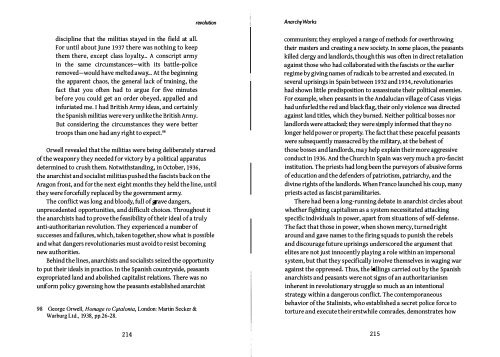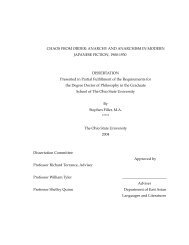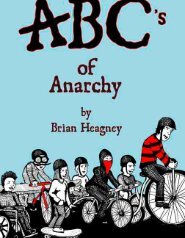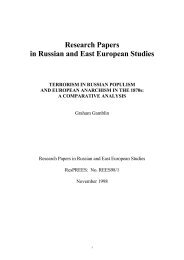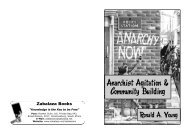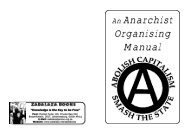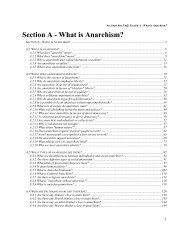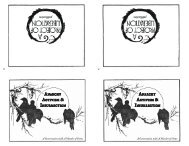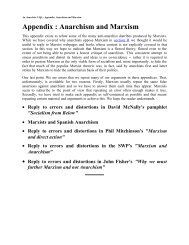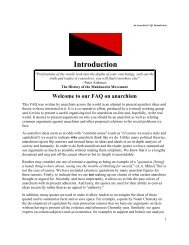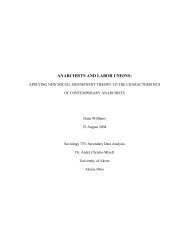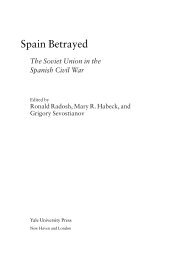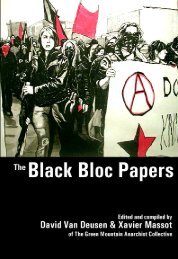Anarchy Works.pdf - Infoshop.org
Anarchy Works.pdf - Infoshop.org
Anarchy Works.pdf - Infoshop.org
Create successful ePaper yourself
Turn your PDF publications into a flip-book with our unique Google optimized e-Paper software.
evolution<br />
<strong>Anarchy</strong> <strong>Works</strong><br />
discipline that the militias stayed in the field at all.<br />
For until about June 1937 there was nothing to keep<br />
them there, except class loyalty ... A conscript army<br />
in the same circumstances-with its battle-police<br />
removed-would have melted away ... At the beginning<br />
the apparent chaos, the general lack of training, the<br />
fact that you often had to argue for five minutes<br />
before you could get an order obeyed, appalled and<br />
infuriated me. I had British Army ideas, and certainly<br />
the Spanish militias were very unlike the British Army.<br />
But considering the circumstances they were better<br />
troops than one had any right to expect,98<br />
Orwell revealed that the militias were being deliberately starved<br />
of the weaponry they needed for victory by a political apparatus<br />
determined to crush them. Notwithstanding, in October, 1936,<br />
the anarchist and socialist militias pushed the fascists back on the<br />
Aragon front, and for the next eight months they held the line, until<br />
they were forcefully replaced by the government army.<br />
The conflict was long and bloody, full of grave dangers,<br />
unprecedented opportunities, and difficult choices. Throughout it<br />
the anarchists had to prove the feasibility of their ideal of a truly<br />
anti-authoritarian revolution. They experienced a number of<br />
successes and failures, which, taken together, show what is possible<br />
and what dangers revolutionaries must avoid to resist becoming<br />
new authorities.<br />
Behind the lines, anarchists and socialists seized the opportunity<br />
to put their ideals in practice. In the Spanish countryside, peasants<br />
expropriated land and abolished capitalist relations. There was no<br />
uniform policy governing how the peasants established anarchist<br />
98 Ge<strong>org</strong>e Orwell, Homage to Catalonia, London: Martin Seeker &<br />
Warburg Ltd., 1938, pp.26-28.<br />
communism; they employed a range of methods for overthrowing<br />
their masters and creating a new society. In some places, the peasants<br />
killed clergy and landlords, though this was often in direct retaliation<br />
against those who had collaborated with the fascists or the earlier<br />
regime by giving names of radicals to be arrested and executed. In<br />
several uprisings in Spain between 1932 and 1934, revolutionaries<br />
had shown little predisposition to assassinate their political enemies.<br />
For example, when peasants in the Andalucian village of Casas Viejas<br />
had unfurled the red and black flag, their only violence was directed<br />
against land titles, which they burned. Neither political bosses nor<br />
landlords were attacked; they were simply informed that they no<br />
longer held power or property. The fact that these peaceful peasants<br />
were subsequently massacred by the military, at the behest of<br />
those bosses and landlords, may help explain their more aggressive<br />
conduct in 1936. And the Church in Spain was very much a pro-fascist<br />
institution. The priests had long been the purveyors of abusive forms<br />
of education and the defenders of patriotism, patriarchy, and the<br />
divine rights of the landlords. When Franco launched his coup, many<br />
priests acted as fascist paramilitaries.<br />
There had been a long-running debate in anarchist circles about<br />
whether fighting capitalism as a system necessitated attacking<br />
specific individuals in power, apart from situations of self-defense.<br />
The fact that those in power, when shown mercy, turned right<br />
around and gave names to the firing squads to punish the rebels<br />
and discourage future uprisings underscored the argument that<br />
elites are not just innocently playing a role within an impersonal<br />
system, but that they specifically involve themselves in waging war<br />
against the oppressed. Thus, the killings carried out by the Spanish<br />
anarchists and peasants were not signs of an authoritarianism<br />
inherent in revolutionary struggle so much as an intentional<br />
strategy within a dangerous conflict. The contemporaneous<br />
behavior of the Stalinists, who established a secret police force to<br />
torture and execute their erstwhile comrades, demonstrates how<br />
214<br />
215


